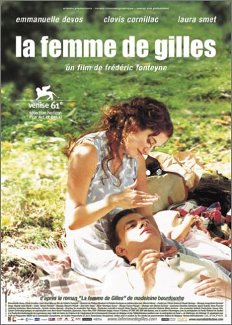
LA FEMME DE GILLES (GILLES' WIFE)
Belgium, 2004, 103 minutes, Colour.
Emmanuel Devos, Clovis Cornillac, Laura Smet.
Directed by Frederic Fonteyne.
Gilles’ Wife is an intense drama of interpersonal relationships. It is set in the 1930s in a provincial French or Belgian town. The film lovingly re-creates the details of the look and life of the people and of the town itself. The film has an authentic feel and a sense of period.
The film was directed by Frederic Fonteyne. Fonteyne had achieved some acclaim with his 1999 film, Un Liaison Pornographique. It also was a story of powerful personal relationships. This time he has adapted a 1937 novel of the same name by Madeline Bourdouxhe.
The film focuses on Emmanuele Devos, the star of Sur Mes Levres as well as Roi et Reine. She has a commanding presence on-screen, a strong woman yet able to communicate vulnerability. Clovis Cornillac is Gilles.
The film seems to offer a picture of domestic life of the period, the hard work at the factory, the housewife at home, delightful twins. However, Gilles soon begins an affair with his wife’s sister. So impassioned is he that he eventually tells his wife and makes her complicit in the affair. The portrait of the husband and his obsession seems particularly intense and almost exasperating for the audience. However, the response of the wife is also puzzling – making the audience ask whether it is better for a wife to erupt, condemn her husband, even oust him or, as happens here, bear the pain interiorly, try to help the husband get over his infatuation as far as possible.
It is extraordinary the length that Gilles’ wife goes to in order to save the marriage. But it does take its toll on her and, as the film progresses and the behaviour of her husband becomes more erratic, seemingly repentant and then just as madly involved, it becomes too much for the wife. She kills herself – and one wonders whether the burden of such a time given to bearing the pain leads to this depression and death.
The film is interesting and entertaining in a particularly French way and demands reflection.
1.The impact of the film? Love, obsession, relationships? The novel written in 1937, a 1930s world?
2.The countryside, the factory, the house, the vegetable garden? The contrast with the town, in the seasons, fine, snow, rain? The shops? An authentic atmosphere of a town in the 30s? The musical score?
3.The title, the focus on Gille’s wife? Audiences empathising with her, her experience, her hurt, her bewilderment, her depression, her death? The credibility of her love, patience, forgiveness?
4.Gille, his work in the factory, coming home, the twin children, making love to his wife, everything seeming normal? Playing with his children? The visit of Victorine? Elisa washing the children? Gille later explaining that this is when he was attracted to Victorine and began the affair? His going out, Elisa following him, realising that he had gone to see Victorine? The confrontation, his telling her everything, impassioned obsessed? Her patient response? His bewilderment at her being calm? Yet his blunt talking to his wife, the need for Victorine, sexually? The growing obsession, getting Elisa to follow Victorine? Suspicion of her relationship with Marechal? His wanting to give up, his going back on his word? His violent outbursts at the home? Yet continually coming home, the pregnancy of his wife, the birth of the child? The months passing by, his seeming to control himself? Going out on the picnic, the family’s joy, yet his checking on Victorine on the way back? His final brutality, bashing Victorine because of Marechal? His return to his wife, the final happy sequence of them all together? His being called when his wife falls from the window?
5.The portrait of Elisa, a housewife of the time, quiet, patient? Her love for her husband, serving him, cooking, lovemaking? Perfect devotion? Her love for the twins, the domestic scenes? Her pregnancy, the new baby? Her believing Gille? Yet her following him, realising the truth? Her anguish, her patience, her not bursting out? Her going to confession and the seeming disinterest of the priest, the platitudinous advice, the heavy penance? Her anger when she went home, in the garden? The further conversation with Gille, saying he would get over the obsession, trying to do her best, taking the baby and following Victorine and seeing her in the shop, telling Gille? The happiness of the picnic day yet the visit to the family and to Victorine? The bashing, her stopping Gille? The return to the house, her parents not wanting Gille to come, the discussion with Victorine, Victorine blaming Elisa for not keeping Gille at home? The return home, the happy scene with the children sitting outside in the sun? The final depression, doing the washing, the dizzy spells, going upstairs, hanging the laundry, going to the window, falling out? On the pavement, still conscious, listening to people say they must call her husband? The attitudes of the 1930s, fidelity, not throwing the husband out, not leaving? Being a martyr – and her going to the church, praying the Hail Mary, looking at the statue of the Pieta, St Joseph, St Sebastian? and his martyrdom? The woman expected to be the martyr?
6.Victorine, Elisa’s sister, the visits to the house, the kiss and the seduction, the secrecy of the affair and her further visits, Elisa following her, the kiss to Marechal, telling Gille that she was going to marry him, her being bashed, her cold response to her sister?
7.The glimpse of her children, the happiness in the household? The baby, its taking its steps?
8.The glimpse of Elisa’s parents, their not being any help?
9.A sad film, a portrait of an obsessive man, his victimising of his wife while trying to be honest, the wife and her patience, expected to be a martyr, it becoming too much for her?